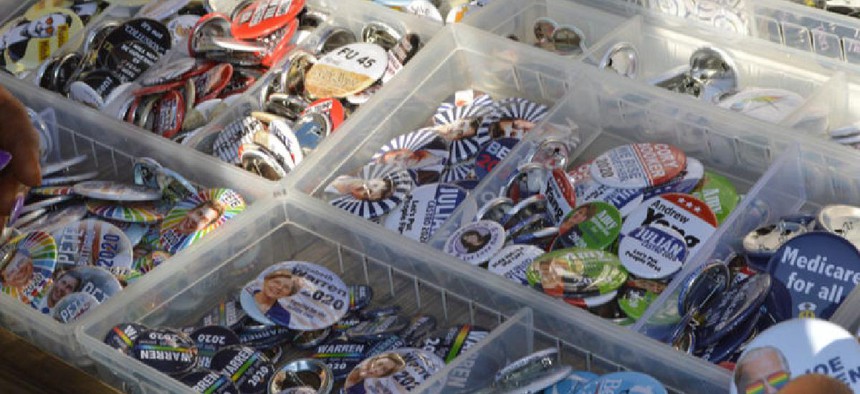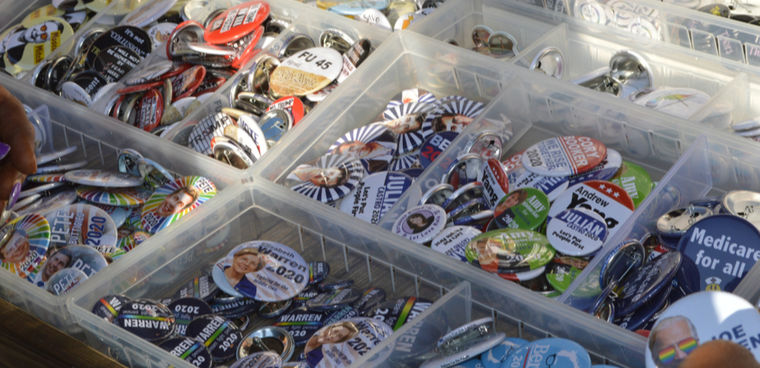Federal employee unions still quiet on endorsements

Public-sector unions are taking a wait-and-see approach after early endorsements in the 2016 cycle.

Unlike previous election years, the federal employment sector's biggest unions are opting to take a cautious approach to issuing candidate endorsements for the 2020 Presidential race.
The American Federation of Government Employees, the federal government’s biggest union, endorsed Democratic candidate former Secretary of State Hillary Clinton in December 2015, in advance of the first caucuses and primaries. More than four years later, however, AFGE, with about 700,000 members, has yet to publicly announce its endorsement decision as the Democratic field campaigns to contest President Donald Trump's bid for reelection.
At its annual legislative conference on Feb. 10, national union officials told reporters that the union planned to poll its rank-and-file members before determining who it would endorse for chief executive.
"As federal government employees, we're electing more than just a president. We're electing leaders of the executive branch. We're going to be doing electronic scientific polling to ensure that we get every member's input prior to us endorsing anyone," National Secretary Treasurer Everett Kelley said. "We’ll gather that data together, analyze it, and then the National Executive Council will come together, observe all of that data, and then we'll make a decision based on the data we receive."
AFGE has challenged several of the Trump administration’s workforce decisions, arguing that its policies have chilled free speech and stripped workers of their collective bargaining rights.
Two Democratic primary contenders, Sen. Bernie Sanders (I-Vt.) and former Vice President Joe Biden have vied most publicly for union endorsements.
Sanders has won endorsements from the American Postal Workers Union, National Nurses United in addition to backing from smaller but high-profile unions like United Teachers-Los Angeles and Service Employees Industrial Union Local 1984.
In January, the International Association of Bridge, Structural and Ornamental Iron Workers endorsed Biden. The International Brotherhood of Electrical Workers which represents some 750,000 workers announced its Biden endorsement on Feb. 5. Not long after Biden announced his presidential campaign last April, the International Association of Fire Fighters endorsed him.
The American Federation of Labor and Congress of Industrial Organizations, the biggest trade union federation in the country and AFGE's parent union, has remained silent on an endorsement.
In September, AFL-CIO issued a statement that "union membership would drive the 2020 endorsement process" and that the federation would host a forum in the spring after reviewing candidates' answers to their policy questionnaire.
In June 2016, after a long primary, the AFL-CIO endorsed Hillary Clinton for president.
The National Treasury Employees Union (NTEU) has not yet made an endorsement in the 2020 presidential race, though it endorsed Clinton in January 2016.
Though union endorsements skew heavily Democratic, Trump received the endorsement of the National Border Patrol Council, and is expected to do so in 2020. The president of the 16,000-member group was honored at a White House reception on Feb. 14.
The endorsement process changes every election due to myriad factors such as who is running for election and the number of candidates in the race, public-sector employment expert and former union official Robert Tobias said in an interview with FCW.
During his tenure as NTEU president from 1983 to 1999, Tobias said that the union would consult with chapter leaders and the executive board and then the national board vote on a resolution.
"When I was president, decisions were made solely on the basis of the view of the presidential candidates towards federal employees," he said in a phone interview.
This included the candidate's attitude towards pay and benefits for federal workers as well labor-management relations.
"There isn’t any other policy or action considered. It's a very narrow focus of attention," he said.
NEXT STORY: Former GSA official among Trump's pardons


